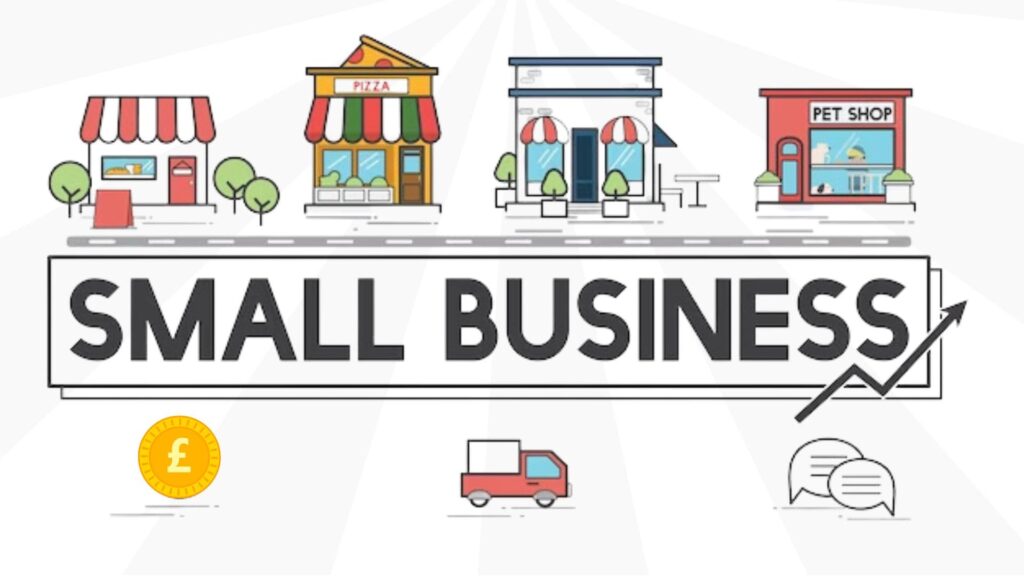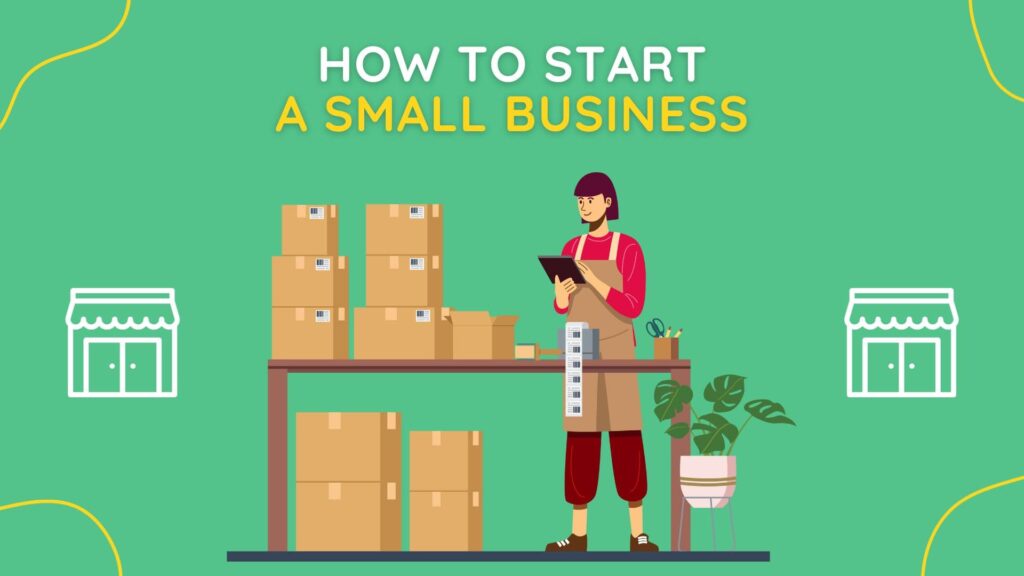
Sammie Ellard-King
I’m Sammie, a money expert and business owner passionate about helping you take control of your wallet. My mission with Up the Gains is to create a safe space to help improve your finances, cut your costs and make you feel good while doing it.

Quickfire Roundup:
To start a small business in 2023, first, pinpoint a niche that addresses current market trends or solves a problem.
Draft a lean business plan and embrace digital transformation by utilising the latest tech tools for productivity, marketing, and communication.
Secure funding through modern channels like crowdfunding, or explore government grants and low-interest loans. Register your business, ensuring compliance with the legal requirements.
Build an MVP (Minimum Viable Product) and leverage social media, content marketing, and influencer partnerships for customer acquisition.
Focus on sustainability and social responsibility, and create a customer-centric business culture. Adapt to market changes rapidly and be data-driven in decision-making. 🚀💡🌍
Many of us have ambitions of running our own businesses. Dreams that we’ve had from much earlier in life. Being our own bosses, working how we want, taking an idea from a spark to a fully-fledged operation.
Many people love the comfort and stability of a 9-5 job. However, others want to break out of that box and live under their own steam.
So, if that sounds like you then start your own small business!
There are more than 5.5 million small businesses in the United Kingdom. However, around 60% of small businesses fail within the first three years.
If you are adamant about starting a business and putting in the hard work and dedication needed, let’s have a look at 10 steps on how to start a small business.
The Ultimate All-In-One Business Account, Perfect for Startups and Entrepreneurs!
Table of Contents
Why do you want to know how to start a small business?
One of the first things to ask yourself is why you want to start a small business. Why is it you want to begin this journey?
Starting your own business is excited but the why is more important than anything!
As already mentioned, it could be that we have had ambitions for a long time. Maybe the idea that has been at the back of your mind for a long time is a surefire money maker, and the world needs to see it.
It could be that you’ve been in the same job all your life and you feel the need to work on something different.
Perhaps you want to prove to those doubters that you have the ability and that idea you’ve been talking about around the coffee table for a good few years actually has legs. Think about your motivation; you are going to need it.
You should consider what you will be giving up. Perhaps you have a great full-time job that gives you a brilliant wage, with money left over for holidays and to fund your pension for your future.
Do you want to swap your current lifestyle and what you are used to for something else?
Some people start a small home business whilst still working but committing to an eight-hour work day followed by getting a business off the ground is difficult for anyone.
You might have the dream and ambition, but the reality is that sometimes things don’t work out. The grass isn’t always greener.
What dependents do you have? Not only a partner and maybe children, but other things such as a mortgage or expensive car payments.
Getting a mortgage as a business owner or even a self employed mortgage is harder so be prepared for this.
The last thing you want to do is start a business and then end up in financial difficulty. You don’t want to end up in a situation that is hard to get out of, especially if you have kids to feed. This isn’t to put you off; this is to make you think.
Should I start small business in 2023?

Running a small business takes an awful lot of hard work and dedication. Setting up businesses is relatively easy so guess what? Get started!
As mentioned above, this isn’t a paragraph to put you off, it’s to make you think about whether you have it in you to push through that nightmare day, put the extra shift in and make sacrifices, all in the name of making your small business a success.
You might consider yourself a bit of an entrepreneur, but do you possess the top five skills that entrepreneurs need?
The Ultimate All-In-One Business Account, Perfect for Startups and Entrepreneurs!
10 steps on how to start a small business
Now that the questions are out of the way, it’s time to look at the steps to start a small business. Progressing through these steps should set you up properly and get you on the road to success.
The initial idea
To start a small business, you need an idea. This could be anything that will help you generate an income.
It could be a product that could be launched and developed into a range. Maybe it’s a service that you would like to offer customers or clients.
The initial business ideas are important. It might have come about by spotting a gap in the market or searching for something that you needed, only to realise it doesn’t exist. However you come up with the idea, you need to have complete confidence in that idea.
You may be starting a business to become your main income or job but you also may be launching a side hustle. If you’re looking for side hustle ideas check out our post on it.
Research & development
You must then look into the ideas in depth. This is one of the most important steps to start a small business.
Has it been done before? Are there any variations on your initial idea? Would you be stepping on any toes by launching this business?
Do your research so you know exactly what is going on with your idea. Then develop it.
This might include getting other people that you trust onboard to sound things out.
Flesh it out into something more tangible than it simply floating around in your mind.
How can you get your idea to where you want it to be? Where will you get your products made? How can you launch it to the public? Where can you sell your services, and who is your demographic market?
Pick up one of the top small business books and learn more about how to research.

Business name & branding
The next stage is coming up with your business name. Maybe the idea you came up with included a name that you could use for both the product and the business.
It could be a play on words or the name that you’d have on signs outside your premises. A quick online search will check if there are other businesses using the same name.
The last thing you want to do on the journey to start a small business is to not find a name that is already in use and the website (see below) unavailable.
Branding is important too. Remember, this is what people will see and associate with your business. Sure, branding can develop over time. However, you need to get it semi-right from the off.
Working with a professional graphic designer is a great idea to bring this to life. They do this for a living, so tap into their knowledge.
They also say setting up a business really begins with the logo. Once you have that it’s all systems go!
Where will you sell or how will you provide your service?
You might start a small business from home or perhaps need actual premises somewhere.
For example, setting up your own business online can probably operate from home. However, a cafe needs somewhere for customers to visit, sit down and enjoy the goodies you have available.
Depending on your small business idea, what you need here will vary but have similarities.
Every business needs a ‘shop window’. That could be an actual shop on a side street in town or the website that you create (we get onto that next) to sell your products and advertise your services.
For online businesses selling products, you may look into other platforms such as Etsy or eBay to sell too. For actual brick-and-mortar shops, you will need to fit out the unit you rent.
This could include tables, shelving, a counter top and others things you need to start a small business.
Setting up a website & social media accounts
You’re going to need a website. You might not think you do, but even shops and cafes need websites. Setting up businesses without them in 2023 is criminal.
This is a great way to show your offerings, and make sure to include your opening hours!
Online businesses definitely need websites to showcase products, give information about services, and of course, sell!
Be sure that you get a domain name that you are happy with and check out this guide on building your own websites.
More people are on social media today than ever before. Reaching out and connecting with customers via social media accounts is a great way to develop your brand and get buy-in from customers.
You don’t need to sign up for every social media account going because posting to all of them can become a job in itself. However, it’s a great idea to have a couple of active accounts. That way, you can connect with customers and also promote your business.
As your business grows you might look to bring in someone to help with social media and content creation.
Small business loans & grants
Did you know that you might be entitled to government grants to start a small business?
There are small business loans available that will need repaying. However, grants are often for specific things and don’t need repaying. These specific things could include the initial launch, research, equipment, and expansion.
It is worth looking into these small business grants because they can be a huge helping hand. Loans can be a great way to help you get your business off the ground if you need financial help. Spend a bit of time looking into this because you might be able to get more help than you imagine.
That being said setting up a small business doesn’t always require funding. It really depends on your idea, product and how you’re planning on going to market.

Setting up a limited company
If you want to set up a limited company, there are lots of things to do. The benefits of a limited include minimising personal liability and creating a separate legal identity.
If this is the route that you want to go down, you need to work through the process, which includes choosing directors, identifying people with significant control and preparing documents.
You can find out more about setting up a limited company here.
Set up business banking
Every business will need a bank account to ensure you keep your business and personal life separate.
As your business grows you’ll also need to have accountants that can easily pay invoices and receive money from sales.
Our favourite business bank is Tide. Check out our full Tide Bank review.
Protecting yourself with insurance
When you are looking to start a small business, insurance is crucial. There are many different insurances to consider, and not all with be applicable to you.
Look up public liability, employers’ liability, landlord insurance, and professional indemnity to start with.
Some people think insurance is a waste of time, but if something happens, you are much better to have insurance in place than to have to pay out yourself. Some insurance policies are a must if you are renting a unit or if you have somewhere that the public visit.
Be sure to compare the prices of insurance and find the policies that are perfect for you, both in terms of what they cover and the money you pay for coverage.
Hiring staff
You might have had the idea for the business yourself, but you will soon come to realise that you can’t do everything yourself. It isn’t good for you, you need a break and even a holiday now and then.
This is where you might consider hiring some staff.
Getting help within the business is a great way to develop and grow. You can’t conquer the world by yourself, you need people you trust and who are good at their jobs beside you.
Your skills only go so far. You didn’t set up a business selling products to become a master bookkeeper. Nor did you start a cafe, so you make all the coffee, wipe tables, and clean toilets seven days a week.
It is a wise decision to take on staff. Advertise the job vacancies in your shop window, on your website, on job advertisement pages and on social media.
Make sure you hold interviews and take time to find the perfect person for the role. When you are first thinking about how to start a small business, you might not be thinking about employees.
However, you will be amazed at how much of a load is lifted off your shoulders when you have someone else working alongside you.
The Ultimate All-In-One Business Account, Perfect for Startups and Entrepreneurs!
Profit, loss & your cash flow
You need to know your numbers. This is true whether you start a small home business or are launching a corporate company.
Businesses live and die on their cash flow. You need to know the financial health of your business.
It is important to keep on top of the profit, loss and cash flow so you can ensure things are working properly.
Ignoring it, leaving it a few weeks or sticking your head in the sand if things are going bad simply won’t help.
Keep one eye on the finance side of your business, check it regularly, and be sure your business is performing how you want it to be.
If things go soar, you can implement change and put things in place as long as you know what is going on.
FAQs
How do I start a small business for beginners?
To start a small business as a beginner, first, pinpoint a viable business idea by identifying a market need or problem you’re passionate about solving. Draft a succinct business plan that outlines your goals, target audience, and revenue model.
Secure necessary funding through savings, loans, or investors, and take care of the legalities by registering your business and obtaining permits. Focus on building a minimum viable product (MVP) to test the market, and use customer feedback to refine your offerings.
Leverage social media and word-of-mouth for cost-effective marketing, and be ready to adapt and evolve based on market demands and opportunities. Keep an eagle eye on finances and continuously seek ways to improve and grow.
How can I start a business with no money?
Starting a business with no money requires creativity and resourcefulness. Opt for a service-based business or use your skills to freelance, minimising the need for inventory or equipment.
Bootstrap by using free online tools and platforms for marketing, communication, and operations. Leverage social media for branding and customer acquisition. Consider bartering services or partnering with someone who can complement your skills.
Apply for small business grants, join startup incubators, or explore crowdfunding options. Focus on delivering exceptional value to build a customer base, then reinvest earnings back into the business for growth. Hustle, adapt, and stay determined!
How do I start a small business from home UK?
To start a small business from home in the UK, first, identify a business idea that aligns with your skills and market demand. Create a business plan detailing your goals, target market, and financial projections.
Register your business with Companies House, and check if you need any licenses or permits. Set up a designated workspace at home and use digital tools for productivity and communication. Leverage social media and online marketplaces for marketing and sales.
Stay compliant with UK tax regulations, including registering for self-assessment with HMRC. Focus on delivering quality products or services, and use customer feedback for continuous improvement. Don’t forget to maintain a work-life balance!
How do I start my own business from scratch?
To start your own business from scratch, first, identify a market need and develop a business idea that addresses it. Create a concise business plan outlining your goals, target market, and revenue strategies.
Secure the necessary funding through personal savings, loans, or investors, and handle legal aspects such as registering your business and obtaining permits or licenses.
Develop a minimum viable product or service and use customer feedback for refinement. Establish an online presence through a website and social media. Network to build relationships and partnerships.
Monitor your finances closely and be ready to adapt your strategies based on market trends and feedback. Stay persistent and focused on delivering value.
Do I need permission to run a business from home?
Running a business from home generally doesn’t require special permission, but it’s wise to check certain aspects. If you’re a homeowner, verify that there are no restrictive clauses in your mortgage or insurance policy.
If you’re renting, consult your tenancy agreement or speak with your landlord to ensure you’re not violating any terms.
Additionally, if your business involves increased traffic, signage, or changes to your property, you may need planning permission from your local council.
It’s also prudent to inform your home insurer and check if you need additional coverage for business assets. Stay compliant to avoid any hitches.
Do small businesses need to be registered UK?
Small businesses must be registered with HM Revenue and Customs (HMRC) for tax purposes.
If you’re operating as a sole trader, you’ll need to register for self-assessment tax returns. If you choose to set up a limited company, you must register with Companies House, which automatically notifies HMRC.
Alongside this, it’s essential to check if your business requires any specific licenses or permits.
If your business’s VAT taxable turnover exceeds the threshold, you must also register for VAT. Ensuring your business is properly registered is critical for legal compliance and smooth operation.
Best business to start in UK 2023?
In 2023, the UK business landscape is ripe for online ventures as the AI revolution streamlines operations and reduces barriers to entry.
Among the top picks are:
-
E-commerce: Utilise AI for inventory management, customer insights, and chatbots. Focus on niche products to face less competition and higher margins.
-
Online Education: Offer courses or coaching in specialised fields. AI can personalise learning experiences, making your platform more effective.
-
Digital Marketing Agency: With businesses vying for online presence, offer marketing services utilising AI tools for analytics and targeting.
-
Subscription Boxes: Curate themed subscription boxes. AI can help in understanding customer preferences and optimise inventory.
-
Freelancing Platforms: Create a platform connecting freelancers with clients, and use AI for matching skills to projects and for streamlined communication.
By embracing online businesses and leveraging AI, entrepreneurs can achieve high profitability with scalable models while optimising effort through automation and data-driven strategies.
Conclusion
Starting your own business can be an amazing journey.
There will be ultimate highs and lows, so crushing you feel like packing it all in. It’s all part of the roller-coaster and part of the lifestyle of running your business.
If you follow some basic steps on how to start a small business, set out your plan and persevere, it can be a journey that you will never regret. Running your own business is often a dream, but for lots of people, it actually becomes a reality.
Share on social media
Disclaimer: Content on this page is for informational purposes and does not constitute financial advice. Always do your own research before making a financially related decision.




Usually, I never comment on blogs, but your article is so convincing that I become unable to stop myself from something about it. You’re doing a great job Man, Keep it up.
Thank you!